- Where We Work
- Africa
- African Union
- Power Africa
- Trade and Investment
- Angola
- Benin
- Botswana
- Burkina Faso
- Burundi
- Cameroon
- Central Africa Regional
- Central African Republic
- Chad
- Côte d'Ivoire
- Democratic Republic of the Congo
- Djibouti
- East Africa Regional
- Eswatini
- Ethiopia
- Ghana
- Guinea
- Kenya
- Lesotho
- Liberia
- Madagascar
- Malawi
- Mali
- Mauritania
- Mozambique
- Namibia
- Niger
- Nigeria
- Republic of the Congo
- Rwanda
- Sahel Regional
- Senegal
- Sierra Leone
- Somalia
- South Africa
- South Sudan
- Southern Africa Regional
- Sudan
- Tanzania
- The Gambia
- Uganda
- West Africa Regional
- Zambia
- Zimbabwe
- Asia
- Europe and Eurasia
- Latin America and the Caribbean
- Middle East
- Mission Directory
Speeches Shim
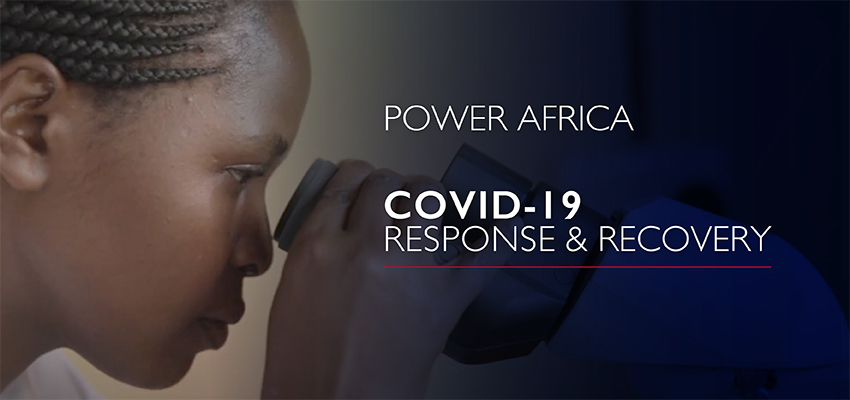
Power Africa’s work before, during, and after the COVID-19 pandemic is critical to helping our partner countries respond to the health crisis, and to boosting self-reliance for economic recovery.
Power Africa: COVID-19 Response ![]() (pdf - 2 MB)
(pdf - 2 MB)
During a global pandemic, electricity is imperative to response and recovery. However, in sub-Saharan Africa, nearly 60 percent of all health care facilities do not have access to electricity, and of those that do, only 34 percent of hospitals and 28 percent of health facilities have reliable access.
Power Africa’s work before, during, and after the COVID-19 pandemic is critical to helping our partner countries respond to the health crisis, and to boosting self-reliance for economic recovery.
Since 2013, Power Africa has helped bring over 4,000 megawatts (MW) of new and more reliable power generation and first-time electricity to 82 million people across sub-Saharan Africa. This new electricity is now powering hospitals and health care facilities, and energizing national- and sector-level strategies to rebuild more effectively and stronger than before.
PRIORITIZING COVID-19 RESPONSE & RECOVERY
Within weeks of the U.S. Government’s response to the COVID-19 pandemic, Power Africa began reprioritizing funds and has thus far redirected more than $5.7 million to support the financial viability of sub-Saharan Africa’s off-grid energy sector; to assess power loads for hospitals, clinics and critical care facilities in Nigeria; and to support regulators and utilities struggling with the unfolding impact of the pandemic in Southern Africa and West. Similar redirections are planned for Power Africa programs in East Africa.
Power Africa quickly channeled our primary program areas toward electricity access interventions that support delivery of health care services and safeguard U.S. staff working abroad:
PROVIDING ON-THE-GROUND TECHNICAL EXPERTISE
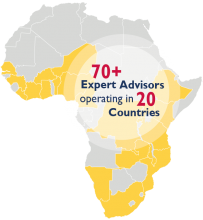 UTILIZING OUR ESTABLISHED IN-COUNTRY NETWORKS
UTILIZING OUR ESTABLISHED IN-COUNTRY NETWORKS
Power Africa is utilizing one of our most valuable assets – a network of more than 70 technical, legal, gender, utility, and other experts and advisors located throughout sub-Saharan Africa – to provide demand-driven assistance to companies, investors, and industry associations aimed at ensuring business continuity, mobilizing relief funding, and advocating for government policies that recognize energy access as an essential service.
Power Africa’s in-country advisors are adept at identifying the technical, financial, and political solutions needed to facilitate faster access to electricity. Their proximity to and relationships with energy ministries and private sector providers expedite the urgent actions needed during this crisis.
POWERING HOSPITALS AND HEALTH CARE FACILITIES
![]()
Through our partners across sub-Saharan Africa, Power Africa connected or kept lights on in more than 800 health care facilities, ensuring a reliable supply of energy to clinics, hospitals, COVID-19 testing centers, isolation quarters, and cold storage services. Power Africa also redirected program 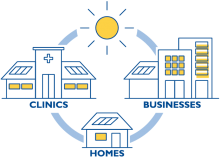 funds to provide $2.6 million in grants to off-grid companies for rural and peri-urban health clinic electrification. In addition, Power Africa is coordinating with our partners Sustainable Energy for All and the World Bank to convene and coordinate donor efforts to electrify health facilities in priority countries throughout sub-Saharan Africa.
funds to provide $2.6 million in grants to off-grid companies for rural and peri-urban health clinic electrification. In addition, Power Africa is coordinating with our partners Sustainable Energy for All and the World Bank to convene and coordinate donor efforts to electrify health facilities in priority countries throughout sub-Saharan Africa.
Rural health clinic electrification is particularly critical during the COVID-19 pandemic given the need to power diagnostic equipment, ventilators, and cold chain demands. In Burundi, Power Africa plans to electrify seven rural health clinics through a pilot business model that guarantees monthly payments to an off-grid electricity provider in exchange for high-quality operations and maintenance. This private sector-led pilot will demonstrate to the Government of Burundi the importance of taking a long-term approach to health clinic electrification.
Through Power Africa and USAID, the United States Government is increasing access to electricity for health centers and communities across Uganda. Improved access to electricity strengthen's Uganda's self-reliance, and capacity to manage COVID-19.
BOLSTERING OFF-GRID MARKETS AND SERVICE PROVIDERS
![]()
The off-grid electricity market in sub-Saharan Africa achieved rapid growth in the last decade and now serves more than 250 million people with life-changing products. The COVID-19 pandemic is challenging companies’ ability to serve existing customers and raise the capital needed to expand into new markets. Power Africa is boosting resilience in the off-grid sector through:
Competitive grants to off-grid companies to electrify health clinics, disseminate public health information, and pursue other forms of revenue generation
Targeted assistance to off-grid companies on business operations continuity and liquidity planning
Support to investors to develop new relief facilities for companies with working capital shortages during the COVID-19 pandemic
Capacity building with local renewable energy associations to advocate that governments declare off-grid electrification as an essential service
STRENGTHENING POWER SECTOR ECOSYSTEMS
![]() Power Africa facilitates investment in electricity transmission infrastructure to strengthen national grids and promote cross-border power trade, and helps modernize electricity distribution services to improve operations and increase energy access. These interventions support national government responses to COVID-19 by keeping medical facilities, homes, and essential services electrified.
Power Africa facilitates investment in electricity transmission infrastructure to strengthen national grids and promote cross-border power trade, and helps modernize electricity distribution services to improve operations and increase energy access. These interventions support national government responses to COVID-19 by keeping medical facilities, homes, and essential services electrified.
Nigeria & Kenya
Power Africa advisors successfully worked with local associations to advocate for solar home system (SHS) companies to be deemed essential services, which allowed continued sales and installations of off-grid energy solutions for rural clinics, businesses, and homes.
Liberia
In 2019, the Liberia Electricity Corporation, with support from Power Africa, connected Monrovia’s Central Medical Store – a refrigerated storage facility – to the grid. Previously, the Medical Store relied on expensive generator fuel to keep vaccines cool.
Nigeria
Four isolation centers and three government testing laboratories, as well as other critical health care facilities providing essential services to the COVID-19 response, are within the catchment areas of Power Africa’s partner electricity distribution companies.
Uganda
A geospatial platform developed as part of rural electrification master plans funded by Power Africa can be used to track infections and to determine populations that may be at risk by correlating the infected person’s location with GIS data.
Ethiopia & Kenya
Power Africa’s partnerships with electricity distribution utilities help the companies supply reliable electricity to nearly 800 active health care facilities.
Through Power Africa and USAID, the United States Government is bolstering electricity transmission and distribution networks across sub-Saharan Africa. Improved access to electricity strengthen's our partner countries' self-reliance and capacity to manage COVID-19.
DOWNLOAD: COVID-19 INFORMATION SHEETS FOR OFF-GRID SOLAR COMPANIES
These information sheets aim to serve as a quick reference for off-grid energy companies operating in sub-Saharan Africa with general information to supplement in-country guidance on preventing the spread of COVID-19 in the workplace.
Info Sheet 2: Strategic Staff Practices
Info Sheet 3: Supporting Customer Practices Information
Info Sheet 5: Supply Chain Practices
Info Sheet 6: Financial Runway Practices

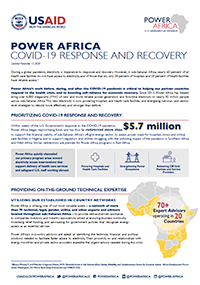
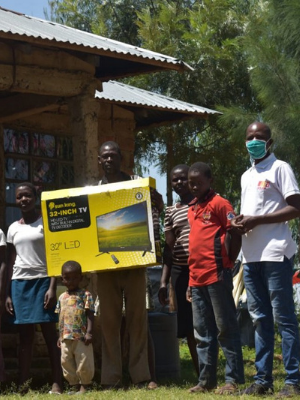
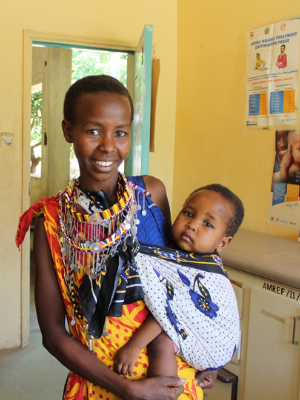
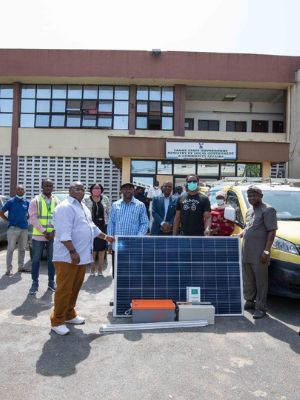
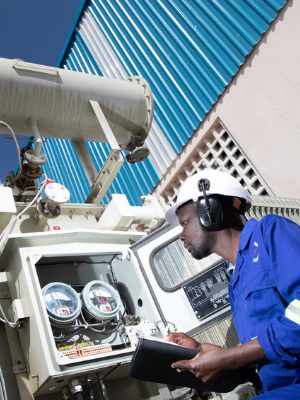
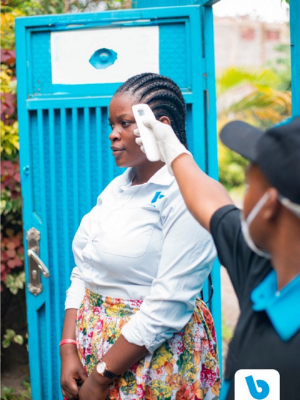
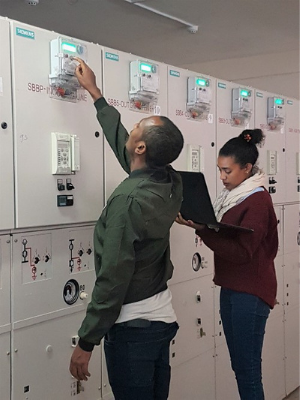
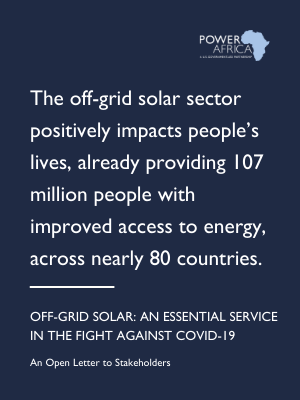
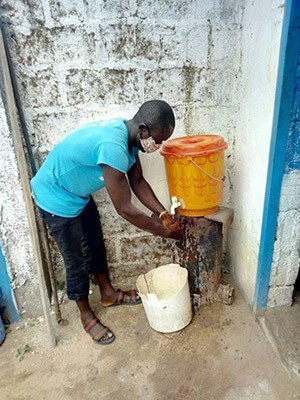
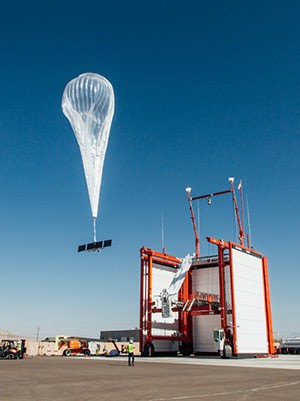
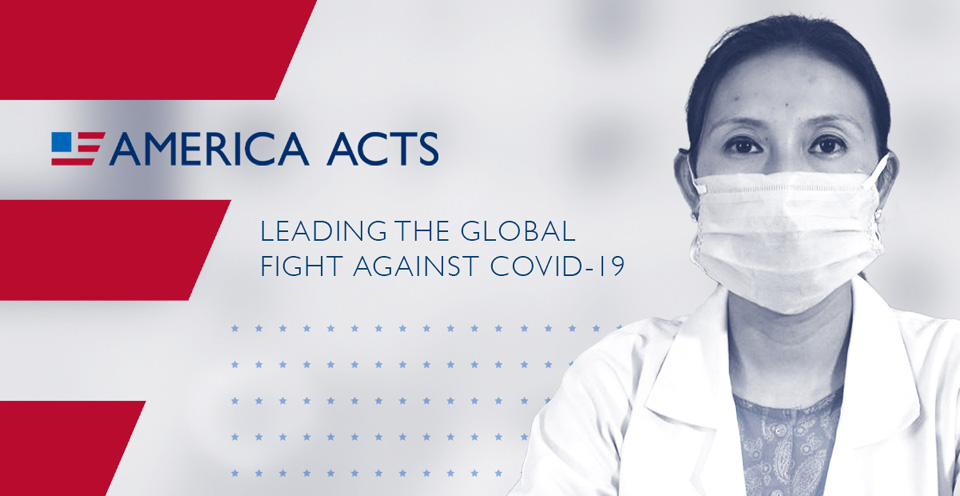
Comment
Make a general inquiry or suggest an improvement.